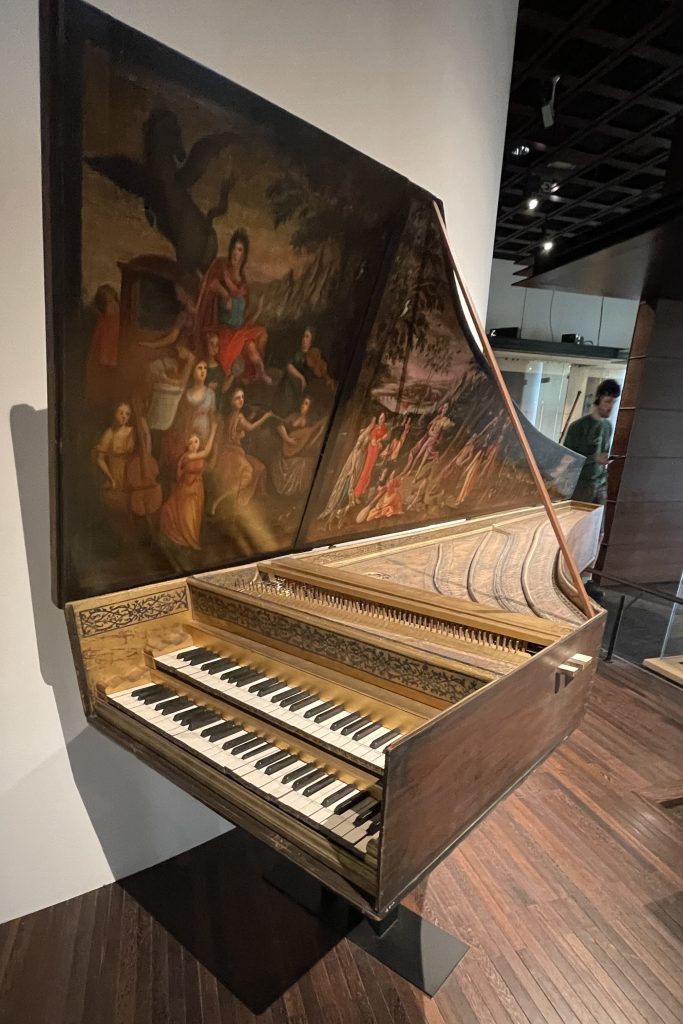
This past fall, my husband and I had the privilege of traveling to Europe for the first time. Countries visited included Germany, the Netherlands, the United Kingdom (London), and France.
If you want to get a little peek into this adventure, listen in on episode #47 of The Piano Pantry Podcast!
The entire trip went quite smoothly. The only transportation hiccup we encountered was traveling via train from the Netherlands to London. One of our trains out of the Netherlands was delayed, causing a missed connection from Brussels to London. Luckily, they could get us on a train later that evening, but it meant we had an eight-hour overlay in Brussels, Belgium.
What at first seemed to be an inconvenience turned into a wonderful opportunity as we could spend an entire day exploring the city! A delay of two or three hours would have kept us waiting at the train station.
As we walked through the city, we passed a beautiful building, its splendor making me pause in awe to take it in.

A closer look revealed it was a musical instrument museum!

(As a side note, my husband and I noticed schoolchildren on field trips in multiple places, each wearing yellow vests. Brilliant!)
Aren’t the details on this building gorgeous?

Since this blog is about piano teaching, I selected around 25 favorites from the keyboard segment of the museum to share in this post – just a fraction of what the museum held! (Plus a couple of fun other instruments.)
They’re listed in date order through the 1500s, 1600s, 1700s, 1800s, and 1900s. A few of the instruments in this post are featured here on the museum’s website. Those that are, I also directly linked below each image.
Enjoy this phenomenal collection!
Keyboard Instruments from the 1500s

Fretted Clavichord – Italy, c1587
Keyboard Instruments from the 1600s

Harpsichord – Italy, 1619

Harpsichord and Virginal – Belgium, 1619

Virginal – Belgium, 1620


Wing-Shaped Spinet – Italy, 1637

Harpsichord – Belgium, 1646
Keyboard Instruments from the 1700s


Clavicytherium – Belgium, 1751

Square Piano – Germany, c1785

Glass Harmonica – Austria, c1786
(OK, not a keyboard instrument, but I had to include it! 🙂

Piano Table “Square Piano” – Germany, 1793
Keyboard Instruments from the 1800s


Cabinet Piano – Brussels, 1830

Giraffe Piano – Netherlands, 1835

Terpodion – United Kingdom, c1840 (see next photo for an up-close look)

Terpodion – United Kingdom, c1840

Claviharpe – Brussels, c1850

Double-Piano with Mirrored Keyboards – France, 1879 (see next photo for a different view)

Double Grand Piano with Mirrored Keyboards – France, 1879

Pedal-Keyboard – Belgium, c 1890 (see next two photos for an up-close look)

Pedal-Keyboard – Belgium, c1890 (see next photo for an up-close look)

Pedal-Keyboard – Belgium, c1890

Harpsichord – France, 1891
Keyboard Instruments from the 1900s

Isomorphic Keyboard – Germany, c1900

Player-Piano, Humanola – Belgium, c1915

Upright-Piano – France, 1930

Piano-Viole – Brussels, 1935 (see next photo for an up-close look)

Piano-Viole – Brussels, 1935

Melodica, Germany, c. 1965

Electric-Piano / Butterfly Baby Grand by Wurlitzer – United States, c. 1969
(P.S. Yes, that’s my lovely husband patiently waiting while I looked at every keyboard instrument!)

Hohner Electra Piano – Germany, 1970
Thank you so much for sharing these beautiful pictures. It is an incredible look into the past and even including a harmonica! My teacher played this heavenly instrument.
Oh, wow, that’s cool!
Amazing! Thank you for sharing!
You’re welcome! 🙂
Incredible pictures, Amy! So interesting. Thanks for sharing!
If you ever have the chance, check out The Musical Instrument Museum in Phoenix. It’s a collection of over 15,000 musical instruments from nearly 200 countries and territories representing every inhabited continent. We thought we’d be there an hour or two but we ended up spending much of a day there.
Wow – that’s amazing! I didn’t know about that one. Now we have a reason to go to Phoenix!
That’s awesome. I’m so glad that you got to enjoy that unexpected delay. Thanks for sharing
You’re welcome – glad you enjoyed!
Thanks for sharing this!
This was fascinating! I plan to share this with my students! I have a few who will be very interested. (I’ll admit that being a singer 1st and pianist 2nd, that some of the instruments were new to me, so I Googled the explanation so I can tell my students about the instruments while they look at the photos.)
Thank goodness for Google! Ha! LOL. Glad you found it valuable and enjoyable!
The Pedal-Keyboard – Belgium, c 1890 is really just an interesting Grand Piano w/ Extra Stops. OF course the Claviharp in English is called “Keyboard Harp” because it’s a Harp played w/ a Keyboard. Claviharp is essentially a 6 Octave Clavicytherium (Upright Harpsichord) Strung w/ Special Strings to emulate a nice lovely Harp sound.
Thank you for this keyboard instrument tour! So interesting, isn’t it? I will admit… I have never heard of a “Geigenwerk” or “Terpodion”. The double-piano with mirrored keyboards fascinated me. Thanks again for sharing.
I had never heard of a lot of these either! So many interesting things!